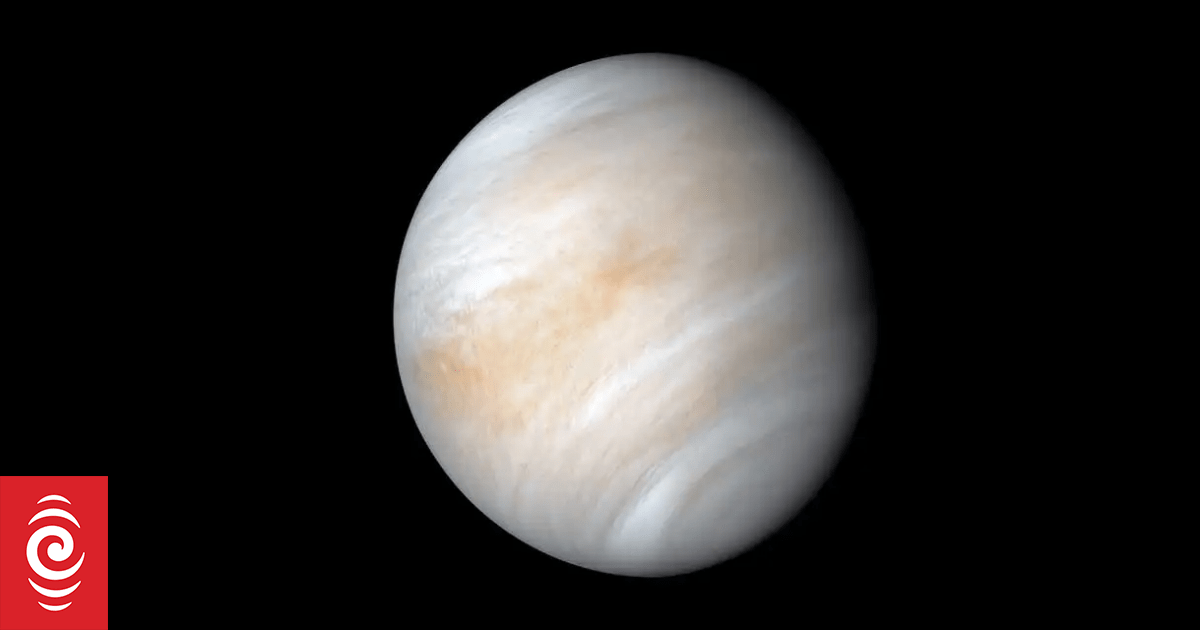
Contrary to its serene appearance, the clouded globe of Venus is a world of intense heat, crushing atmospheric pressure and clouds of corrosive acid.
Photo: NASA/JPL-Caltech
To 1950s stargazers, the planet Venus looked like “a forest world where it’s always raining”, says rock star physicist Dr Brian Cox.
We now know that this cloudy-looking neighbour is covered in thousands of volcanoes and hellishly hot.
“It’s well over 400 degrees Celsius on the surface so lead would melt into molten lead. The pressure is 90 times the atmospheric pressure on Earth.
“The clouds are not beautiful clouds of water but they rain sulphuric acid – concentrated battery acid – so it’s about as close to hell as you can get.”

A digital image of Earth’s home solar system which is home to eight planets and five officially recognised dwarf planets.
Photo: NASA
With over 40 spacecraft currently exploring our solar system, there’s no better time for a new TV show about our neighbouring planets and moons, Cox tells Saturday Morning.
In the new BBC series Solar System, he explores environments with acid rain, ice mountains and nitrogen glaciers.
While it’s easy to think of the other planets in our solar system as just “strange little points of light in the sky”, learning about them can teach us a lot about the nature of Earth, Cox said.
“Mars and Venus are really similar to Earth so it’s almost as if nature’s given us this gift of three different experiments that have played out in different ways, and by studying them all we get a much deeper insight into our planet.”

NASA’s Curiosity rover vehicle took this ‘selfie’ in 2018.
Photo: AFP / NASA
Although Venus now seems an unlikely place for life as we know it, Mars remains a possibility, Cox said, and two very big NASA rovers – Curiosity and Perseverance – are now patrolling the planet’s rocky surface looking for signs.
“We think that the conditions that led to the origin of life on Earth 4 billion years ago were present on Mars – our nearest neighbouring planet – 4 billion years ago. So we think that life may have begun on Mars. It could possibly – if it began – still exist on Mars.”

Professor Brian Cox
Photo: Dustin Rabin
The more carefully we study the planets within the Earth’s solar system, the more we find places where life could possibly exist, Cox said.
But if life is out there in our neighbourhood, he said it will be “simple at best”.
“If you think it took 4 billion years roughly to go from the origin of life on Earth to us – an unbroken chain of life for one-third of the age of the universe – that might suggest that complex things like us are very rare indeed.
“An educated guess is that there might be no other civilisation like this perhaps in the galaxy or at least for many thousands or even millions of light years in every direction.”
That said, spacecraft are still discovering “really weird things” about tiny little places far away from the sun that we can’t see very well and haven’t visited much, Cox said.
“There’s a little asteroid-type thing called Ceres and it’s smaller than our moon. But we saw on there deposits of salt on the surface, bright patches of salt, and it’s a kind of salt that doesn’t last very long and only forms in the presence of water… This rock orbiting far away from the sun may have an ocean below its surface. That’s so important because on Earth where you find water, you find life.”

A bright patch of salt on the surface of the dwarf planet Ceres.
Photo: NASA
If Earth turns out to be the only place where living things like us exist – “collections of atoms that can have conversations and explore the universe and speculate and have feelings about the universe” – this will just be confirmation that our home planet is valuable beyond measure, he said.
“The solar system is a beautiful and fascinating place but by far the most fascinating place and the most precious place in our neighbourhood is Earth.”
In a former life, Cox played keyboards in the band D:Ream which had a hit in 1993 with ‘Things Can Only Get Better’.
Although it became a political anthem after being used in the 1997 UK election, D:Ream singer Peter Connor wrote it more as a song of celebration, he said.
“It’s about an optimistic vision for the future.”

